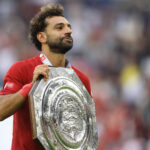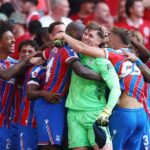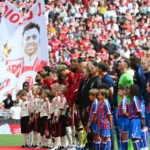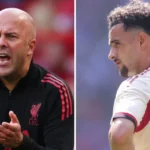Manchester City Won the Community Shield”: Pep Guardiola Defends Club’s Trophyless
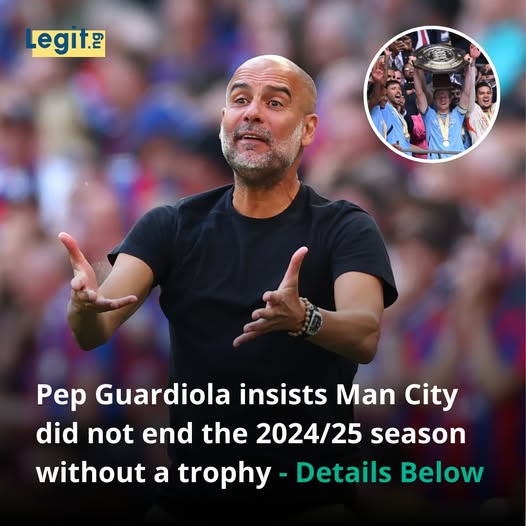
For the first time in eight years under the stewardship of Pep Guardiola, Manchester City will end the 2024/25 season without claiming a major trophy. The final nail in the coffin of their silverware hopes came at Wembley Stadium on Saturday, May 17, when Crystal Palace secured a shocking 1-0 victory in the Emirates FA Cup final. This defeat marks a significant downturn for a club that has dominated English football for much of Guardiola’s tenure, raising questions about the future direction of the Manchester City project.
Crystal Palace’s triumph, their first major trophy in the modern era, was sealed by Eberechi Eze’s first-half strike. The Eagles’ victory was further bolstered by an exceptional performance from goalkeeper Dean Henderson, who denied Manchester City multiple times, including a crucial penalty save from Omar Marmosh’s spot-kick in the 36th minute and the subsequent rebound attempt from Erling Haaland.
The defeat leaves Manchester City in an unusual position of vulnerability. Currently sitting sixth in the Premier League with 65 points and only two matches remaining, they face the very real possibility of missing out on Champions League qualification for the 2025/26 season—a scenario that would have been unthinkable at the beginning of the campaign.
Guardiola’s Defiant Response: “We Won the Community Shield”
In the aftermath of the FA Cup final defeat, Pep Guardiola displayed a mixture of defiance and pragmatism when addressing the media. The 54-year-old Catalan coach, known for his perfectionist approach and tactical innovations, insisted that Manchester City had not, in fact, finished the season without silverware.
“It is important for Manchester City to qualify for the UEFA Champions League,” Guardiola stated in his post-match press conference. “Except for Newcastle who won the Carabao Cup, Liverpool who won the Premier League, and Manchester City that won the Community Shield—the other teams didn’t win trophies.”
This reference to the Community Shield—the traditional curtain-raiser to the English football season played between the Premier League champions and FA Cup winners from the previous campaign—raised eyebrows among pundits and fans alike. Traditionally, the Community Shield is viewed as a glorified friendly rather than a major honor, though its status as an official trophy remains a point of contention within football circles.
Guardiola’s comments appeared particularly pointed given the ongoing rivalry with Arsenal and their manager Mikel Arteta, his former assistant. Arsenal fans were quick to highlight what they perceive as a double standard, noting that when Arteta won the Community Shield with Arsenal (which he has done twice), it was often dismissed as insignificant by pundits and rival supporters.
“Ironic how the Community Shield is a trophy for everyone apart from when Arsenal win it,” remarked one fan on social media, encapsulating the sentiment shared by many Arsenal supporters.
The FA Cup Final: A Tale of Missed Opportunities
While the scoreline suggests a straightforward victory for Crystal Palace, the reality of the FA Cup final was far more complex. Manchester City dominated large portions of the match, particularly in the first half, creating numerous scoring opportunities that they failed to convert.
Dean Henderson proved to be the difference-maker, producing a series of remarkable saves to deny Erling Haaland, Josko Gvardiol, and Jeremy Doku in the first half alone. The pivotal moment came in the 36th minute when City were awarded a penalty following a rash challenge from Tyrick Mitchell on Bernardo Silva.
Surprisingly, it was Omar Marmosh who stepped up to take the spot-kick rather than Haaland, City’s prolific Norwegian striker. Henderson not only saved Marmosh’s attempt but also managed to recover in time to block Haaland’s follow-up effort. This sequence of events has become emblematic of City’s season—filled with promise but ultimately lacking the clinical edge that has defined their previous campaigns.
Guardiola acknowledged as much in his post-match assessment: “We played a really good final, not enough to win it,” he conceded. “And we have the last two games, we need four points to be in the Champions League next year, and this is enough, and everyone has to be aware of that.”
The Haaland Controversy: Leadership Questions Emerge
The decision to have Marmosh take the penalty instead of Haaland has sparked significant debate about leadership within the Manchester City squad. Former Chelsea and Nigeria midfielder John Mikel Obi was particularly critical of Haaland’s choice to pass up the responsibility in such a crucial moment.
“In big games, your big players need to step up,” Mikel Obi stated in his analysis for a prominent sports network. “When the pressure is on, that’s when true leaders show themselves. For me, Haaland should have taken that penalty—it’s a moment that could have changed the entire complexion of the final.”
This criticism highlights a growing concern among observers about Haaland’s influence in decisive matches. While his goal-scoring record remains impressive, questions about his overall contribution and leadership in high-stakes situations persist.
The penalty incident has become a lightning rod for broader discussions about Manchester City’s mentality in crucial games this season. Whether fair or not, it has been interpreted by some as symbolic of a team that has lost some of its killer instinct—a quality that had been their hallmark during their period of dominance.
Crystal Palace’s Historic Achievement
While much of the narrative has focused on Manchester City’s failures, it would be remiss not to acknowledge the scale of Crystal Palace’s achievement. Under their management, Palace have transformed from perennial relegation candidates to FA Cup winners, securing their first major trophy in the process.
Henderson’s heroics between the posts were complemented by a disciplined defensive performance from the entire team, with Tyrick Mitchell recovering well from his penalty concession to contribute significantly to Palace’s resilience at the back.
Eberechi Eze’s match-winning goal showcased the quality that has made him one of the Premier League’s most exciting talents in recent seasons. His clinical finish, coming against the run of play, demonstrated the opportunistic edge that City themselves have lacked in crucial moments this campaign.
For Palace, this victory represents the culmination of years of steady progress and smart recruitment. Their triumph serves as a reminder of football’s unpredictability and the possibility for clubs outside the traditional elite to achieve significant success when ambition is matched with astute planning.
City’s Broader Season: What Went Wrong?
Manchester City’s struggles this season extend far beyond the FA Cup final disappointment. Currently sitting sixth in the Premier League with 65 points, they find themselves in unfamiliar territory—looking up at clubs they’ve routinely finished above during Guardiola’s tenure.
Liverpool’s resurgence under Jürgen Klopp’s successor has seen them reclaim the Premier League title that City had made their own in recent years. Newcastle United’s Carabao Cup victory earlier in the season further diminished City’s chances of silverware, while their earlier-than-expected exit from the Champions League—a competition they conquered in 2023—completed a disappointing campaign on all fronts.
Several factors have contributed to this decline. Injuries to key players at crucial junctures disrupted the team’s rhythm, while the departure of certain influential figures from previous successful squads has altered the team’s dynamic. Additionally, there have been signs that opponents have become more adept at countering Guardiola’s tactical approach, developing strategies specifically designed to exploit perceived weaknesses in the City system.
Furthermore, the ongoing uncertainty surrounding the club’s 115 charges for alleged financial breaches has created a backdrop of instability that may have affected performance on the pitch. While the club vehemently denies any wrongdoing and continues to fight these charges, the protracted nature of the case has cast a shadow over Manchester City’s operations.
The Champions League Dilemma
Perhaps the most pressing immediate concern for Manchester City is securing Champions League qualification for next season. Guardiola emphasized this priority in his post-match comments, noting that the club needs four points from their remaining two fixtures to guarantee their place in Europe’s elite competition.
“We have the last two games, we need four points to be in the Champions League next year, and this is enough,” Guardiola stated, highlighting the adjusted expectations for a club that has habitually set its sights much higher.
Missing out on Champions League football would represent more than just a sporting disappointment—it would have significant financial implications as well. The revenue generated from participation in the competition is substantial, and its absence would impact the club’s ability to compete in the transfer market and potentially affect their compliance with financial regulations.
Moreover, the prestige of Champions League football is a key factor in attracting and retaining top talent. Should City fail to qualify, questions would inevitably arise about the futures of certain star players who may be tempted by opportunities elsewhere.
The Future of Guardiola
As Manchester City’s season threatens to end in unprecedented disappointment under his leadership, speculation naturally turns to Pep Guardiola’s future at the club. The Catalan coach’s contract situation is always a topic of intense interest, and the current circumstances have only intensified discussions about his long-term plans.
Having achieved unprecedented success during his tenure—including multiple Premier League titles, domestic cups, and the Champions League triumph that had long eluded the club—there is a sense that Guardiola may be approaching the end of a cycle at Manchester City. The challenge of reinvigorating a squad that appears to have lost some of its edge may require significant changes in personnel and approach.
However, Guardiola has previously demonstrated his capacity for reinvention, rebuilding City’s squad following earlier periods of transition. His ability to evolve tactically and nurture new generations of talent suggests he may yet oversee another successful era at the Etihad Stadium if he chooses to extend his stay.
For now, Guardiola remains focused on the immediate task at hand—securing those crucial four points to salvage Champions League qualification from a disappointing campaign. His reference to the Community Shield as a trophy, while perhaps intended to mitigate the perception of failure, indicates a manager keenly aware of the expectations that come with his position.
The Social Media Reaction: Fans and Pundits Divided
The reaction to Guardiola’s comments about the Community Shield has been predictably polarized along club allegiances. Arsenal supporters, in particular, have been vocal in highlighting what they perceive as hypocrisy in the football community’s treatment of different managers and clubs.
“If it was Arteta who said he won the Community Shield, the entire English media would want his head,” suggested one fan on social media, highlighting the perceived double standard.
Others took a more direct approach in their criticism: “Pep, you have literally won everything. Don’t lower yourself to thinking the charity plate is something to talk about,” wrote another supporter, expressing the view that Guardiola’s comments represented an uncharacteristic lowering of standards from a manager who has consistently set the bar exceptionally high.
The debate extends beyond just fans, with pundits and former players also weighing in on the significance of the Community Shield and Guardiola’s attempt to frame it as meaningful silverware in the context of an otherwise barren season.
The Broader Context: End of an Era?
Manchester City’s difficulties this season raise fundamental questions about the sustainability of success in modern football. Even with vast resources, exceptional coaching, and a meticulously assembled squad, maintaining peak performance year after year presents enormous challenges.
The physical and mental toll of competing on multiple fronts season after season cannot be underestimated. Players who have been integral to City’s success are aging, and while the club has invested in younger talent, replacing the experience and winning mentality of established stars is never straightforward.
Additionally, the financial landscape of football continues to evolve, with competitors strengthening and the regulatory environment becoming increasingly complex. The outcome of the 115 charges faced by the club could have far-reaching implications for their future operations and competitive standing.
Against this backdrop, the current season might be viewed not simply as an anomaly but as the beginning of a new phase for Manchester City—one that requires adaptation and renewal rather than continuation of past approaches.
Conclusion: A Watershed Moment for Guardiola’s City
The image of Pep Guardiola watching his team dominate possession but fail to convert chances in the FA Cup final encapsulates Manchester City’s season—a campaign defined by familiar patterns of play but uncharacteristic failures in crucial moments.
Crystal Palace’s victory, secured through resilient defending and clinical finishing, serves as a reminder that in football, tactical sophistication and technical superiority do not always translate to success. Sometimes, determination, organization, and a moment of quality are enough to overcome even the most accomplished opponents.
For Manchester City, the immediate focus must be on securing Champions League qualification in their remaining fixtures. Beyond that, a period of reflection and potentially significant change awaits. Whether Guardiola remains at the helm to oversee this transition will be one of the summer’s most intriguing storylines.
The reference to the Community Shield, while perhaps intended to deflect criticism, ultimately highlights the extraordinary standards that Guardiola himself has established during his time at Manchester City. When the Community Shield—a trophy he has previously won multiple times without particular fanfare—becomes worthy of specific mention, it underscores just how unusual this trophyless season is in the context of his tenure.
As the 2024/25 season draws to a close, Manchester City find themselves at a crossroads. The decisions made in the coming months will shape not just their immediate future but potentially the next era of the club’s history. For Guardiola and his team, the challenge now is to demonstrate that this season represents merely a temporary setback rather than the beginning of a decline.
Additional reporting by Sports Analysis Team
